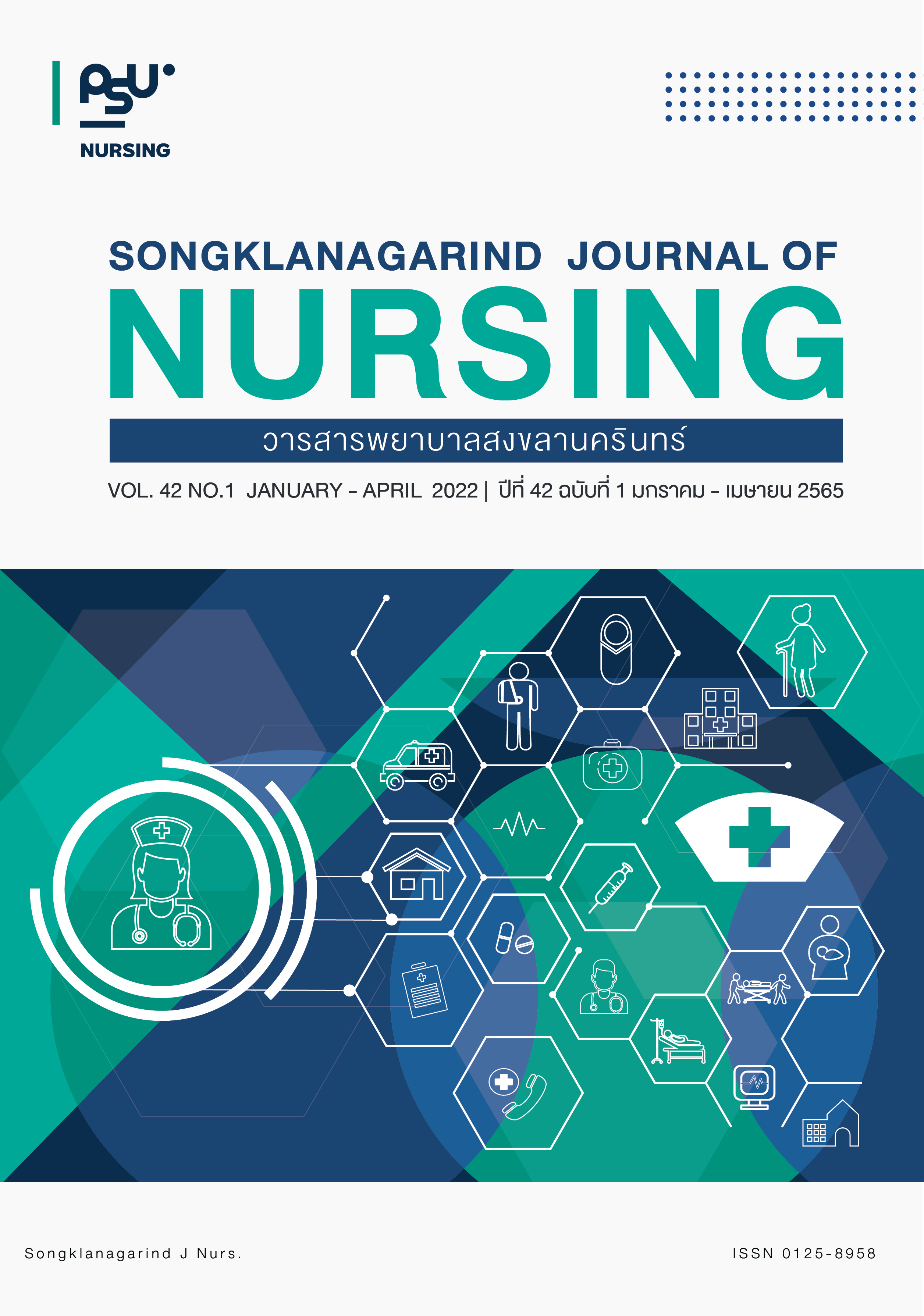ปัจจัยที่มีความสัมพันธ์กับพฤติกรรมการส่งเสริมพัฒนาการทางสมอง ของทารกในครรภ์ของมารดาวัยรุ่นครรภ์แรก
Main Article Content
บทคัดย่อ
วัตถุประสงค์: (1) เพื่อศึกษาระดับพฤติกรรมการส่งเสริมพัฒนาการทางสมองของทารกในครรภ์ทั้งโดยรวมและรายด้าน และ (2) เพื่อศึกษาปัจจัยที่เกี่ยวข้องกับพฤติกรรมการส่งเสริมพัฒนาการทางสมองของทารกในครรภ์ของมารดาวัยรุ่นครรภ์แรก วิธีการวิจัย: กลุ่มตัวอย่างคือ มารดาครรภ์แรกที่มีอายุ 10-19 ปี ฝากครรภ์ในโรงพยาบาลสังกัดกระทรวงสาธารณสุขของจังหวัดสงขลา รวม 5 โรงพยาบาล จำนวน 167 คน เครื่องมือที่ใช้ในการวิจัย ได้แก่ แบบสอบถาม 8 ส่วน (1) ข้อมูลส่วนบุคคล (2) พฤติกรรมการส่งเสริมพัฒนาการทางสมองของทารกในครรภ์ (3) การรับรู้ประโยชน์ฯ (4) การสนับสนุนจากบุคคล
ในครอบครัวฯ (5) การสนับสนุนจากบุคลากรทีมสุขภาพฯ (6) ความรู้ฯ (7) ภาวะเครียด และ (8) ความเสี่ยงต่อโรคซึมเศร้า วิเคราะห์ข้อมูลโดยการแจกแจงความถี่ ร้อยละ ค่าเฉลี่ย และส่วนเบี่ยงเบนมาตรฐาน วิเคราะห์ความสัมพันธ์ระหว่างปัจจัยที่ศึกษาโดยใช้สถิติสหสัมพันธ์แบบเพียร์สัน ผลการศึกษา: พบว่า คะแนนพฤติกรรมการส่งเสริมพัฒนาการทางสมองของทารกในครรภ์โดยรวมอยู่ในระดับปานกลาง (M = 27.36, SD = 5.46) คะแนนพฤติกรรมส่งเสริมพัฒนาการทางสมองของทารก
ในครรภ์ด้านการได้ยินและด้านการรับรู้ความรู้สึก อยู่ในระดับปานกลาง (M = 13.83, SD = 3.29) และ (M = 13.53, SD = 2.82) ตามลำดับ ปัจจัยที่มีความสัมพันธ์กับพฤติกรรมการส่งเสริมพัฒนาการทางสมองของทารกในครรภ์ ได้แก่ การรับรู้ประโยชน์ฯ (r = .446, p < .01) การสนับสนุนจากบุคคลในครอบครัวฯ (r = .423, p < .01) การสนับสนุนจากบุคลากรทีมสุขภาพฯ (r = .229, p < .01) และความรู้ฯ (r = .206, p < .05) ส่วนภาวะเครียด และความเสี่ยงต่อโรคซึมเศร้าไม่มีความสัมพันธ์กับพฤติกรรม สรุป: ผลการศึกษาครั้งนี้สามารถใช้เป็นข้อมูลในการพัฒนารูปแบบการพยาบาลเพื่อส่งเสริมพฤติกรรมการส่งเสริมพัฒนาการทางสมองของทารกในครรภ์ของมารดาวัยรุ่นครรภ์แรกต่อไป
Article Details

อนุญาตภายใต้เงื่อนไข Creative Commons Attribution-NonCommercial-NoDerivatives 4.0 International License.
เอกสารอ้างอิง
Ministry of Public Health. Live birth rate among women aged 15-19 [Internet]. Nonthaburi: Ministry of Public Health; 2020 [cited 2021 May 30]. Available from: http://healthkpi.moph.go.th/kpi2/kpi/index/?id=1413&kpi_year=2563
Tumchuea S, Pumprayool P, Teenage pregnancy: Concept of solving problems with the district health system. J Hlth Sci Res. 2018; 20(2): 29-38. Thai.
Shuaytong P, Nammgorn B, Karuhadej P, et al. Quality of life of adolescents with first pregnancy in Ubon Rachathani province. Journal of Nursing and Health Suan Sunandha Rajabhat university. 2018; 1(2): 27-41 Thai.
Worasing T. Pregnancy outcomes between teenage pregnancy and adult pregnancy. MJSBH. 2016; 31(2): 61-9. Thai.
Lertsakornsiri M. The life assets and health promotion behavior in teenage pregnancy. NUJST. 2016; 24(1): 13-23. Thai.
Ministry of Public Health. Study the 6th of factors effecting to child development in Thailand in 2017 [Internet]. Nonthaburi: Ministry of Public Health; 2017 [cited 2022 Jan 5]. Available from: http://203.157.71.139/group_sr/allfile/1580280672.pdf. Thai.
Chaiyawat M. Nutrition in the early stages of life smart kids can be created [Internet]. Bangkok; 2018 [cited 2020 Dec 30]. Available from: https://apps.hpc.go.th/dl/web/upFile/2018/12-4245-20181203165234/543069cfda0779b9b10c6706a21280aa.pdf. Thai.
Kotchabhakdi N. Brain development [Internet]. Bangkok; 2016 [cited 2020 Dec 1]. Available from: http://neuroscience.mahidol.ac.th/NBBC2009/NK_BrainDevelopment2008.pdf. Thai.
Kaewsiriwan S. Nursing during pregnancy. Bangkok: Chulalongkorn University; 2013. Thai.
Oangkanawin P. Promotion and development of the fetal brain. Veridian E-Journal Science and Technology Silpakorn University. 2016; 3(6): 162-71. Thai.
Webb AR, Heller HT, Benson CB, et al. Mother’s voice and heartbeat sounds elicit and victory plasticity in the human braun before full gestation. PNAS. 2015; 112(10): 3152-157.
Songwatthanayuth P, Watthanakorn K, Klinhom K, et al. Effects of family and village health volunteer participation program on health promoting behaviors and blood pressure in pre-hypertension adults. Veridian E-Journal Science and Technology Silpakorn University. 2016; 3(3): 1-14. Thai.
Yakasem P, Chaiyasung P. Effect of prenatal attachment promoting program on maternal-fetal attachment in teenage pregnant women. Journal of Nursing Science & Health. 2012; 35(3): 19-25. Thai.
Pender NJ, Murdaugh CL, Parsons MA. Health promotion in nursing practice. 5 th ed. New Jersey: Pearson Education; 2006.
Winalaivanakoon C. Selected factors related to health responsibility behaviors among pregnant adolescents in Amnat Charoen Province. JNSU. 2019; 20(39): 8-19. Thai.
Srisawad K, Panyapinijnugoon C. Stress among pregnant adolescents. JRTAN. 2016; 17(2): 7-11. Thai.
Khumphan S, Meepring S, Damchuti I. The mental health status among pregnant women. Journal of Nursing and Health Sciences. 2020; 14(1): 135-44. Thai.
Maeda K, Tatsumura M. Fetal Response to sound and light: possible fetal education?. J Neonatal Biol. 2017; 6(1): doi: 10.4172/2167-0897.1000247.
Viola M, Emese N. Fetal behavioural responses to maternal voice and touch. PLOS ONE. 2015; 10(6). doi: 10.1371/journal.pone.0129118.
García J, Ventura M, Manchon F, et al. Effects of prenatal music stimulation on fetal cardiac state, newborn anthropometric measurements and vital signs of pregnant women: A randomized controlled trial. Complementary Therapies in Clinical Practice. 2017; 27(1): 61-7: doi: 10.1016/j.ctcp.2017.03.004.
Cohen J. Statistical power analysis for the behavior sciences. 2 nd ed. Hillsdale New Jersey : Lawrence Erlbaum; 1988.
Polit DF, Beck CT. Nursing research principles and methods. 9 th ed. Philadelphia: Lippincott; 2012.
Silpakit O. Srithanya stress scale. J Ment Health Thai. 2008; 16(1): 85-177. Thai.
Arunpongpaisal S, Kongsuk T, Maneeton N, et al. Development and validity of two-question-screening test for depressive disorders in Thai I-san community. J Psychiatr Assoc Thailand. 2006; 52(2): 138-48. Thai.
Saks M, Allsop J. Researching health qualitative, quantitative and mixed methods. 2nd ed. London: SAGE; 2012.
Khumtorn L. How to prevent unwanted teenage pregnancy?. JBCN_Bangkok. 2014; 30(3): 97-105. Thai.
Loke AY, Poon CF. The health concerns and behaviours of primigravida: comparing advanced age pregnant women with their younger counterparts. J Clin Nurs. 2011; 20(7): 1141-150. doi: 10.1111/j.1365-2702.2010.03433.x.
Preesong K. Factors Related to self-care behaviors of pregnant womenat bangna 5 hospital, Samutprakarn Province. RPJ. 2015; 33(3): 116-36. Thai.
Kaeonoi A, Phumonsakul S, Gerdprasert S. Factors related to health promoting behaviors and gestational age at birth of pregnant women at risk of preterm birth. Rama Nurs J. 2018; 24(3): 264-78. Thai.
Wilson-Mitchell K, Bennett J, Stennett R. Psychological health and life experiences of pregnant adolescent mothers in Jamaica. Int J Environ Res Public Health. 2014; 11(5): 4729-744. doi: 10.3390/ijerph110504729.
Sanmongkol S. Health perception, social support and self-care behaviors among adolescent pregnant in Phuket Province. Reg 11 Med J. 2016; 30(2): 105-14. Thai.
Khunthar A. The impacts and solutions to nursing workforce shortage in Thailand. J Nurs Sci. 2014; 32(1): 81-90. Thai.


